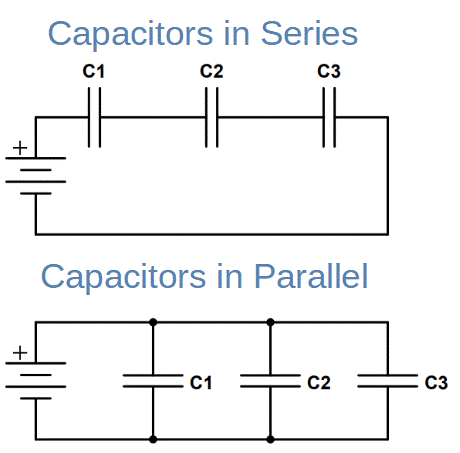The calculator below can be used to determine the total equivalent capacitance of up to four (4) capacitors in series.
Capacitors are said to be in series when there is a single current path that travels through each capacitor in order.
Capacitors are in parallel when there are multiple current paths that may have different values of capacitance.
One of the most important quantities that tells us about the total capacitance in the circuit is the equivalent capacitance .

In a series circuit, current must flow through every circuit component; there is only one current path. Capacitance, in particular, decreases with every additional capacitor in a series circuit. In the series circuit above, each individual capacitor (C1, C2 and C3) would contribute more capacitance to the circuit than the three combined.
Even though capacitors may come in complex configurations, we can often model the whole circuit as one single capacitor. This capacitor would have the value of the equivalent capacitance of the whole circuit.
To use the calculator, first select the number of capacitors. Enter the capacitor values sequentially, starting with C1.
Formula for Capacitors in Series
Capacitors in series have a total equivalent capacitance that is less than the capacitance of any of the individual capacitors. The outermost plates of the outermost capacitors (the left-side plate of C1 and right-side plate of C3 in the parallel circuit above) function as the primary plates of the equivalent capacitor.
The formula for capacitors in series mirrors that of resistors and inductors in parallel.
To find the total capacitance in a series circuit (or a single branch of a parallel circuit), you find the reciprocal (‘ one over 1/ ‘) of the sum of the reciprocal of each individual value of capacitance:
C_{eq} = \frac{1}{\frac{1}{C_1}+\frac{1}{C_2}+\frac{1}{C_3}+...+\frac{1}{C_N}}=(\frac{1}{C_1}+\frac{1}{C_2}+\frac{1}{C_3}+...+\frac{1}{C_N})^{-1}If this calculator, didn’t help, check out our other calculators for electronics or our comprehensive tutorials!